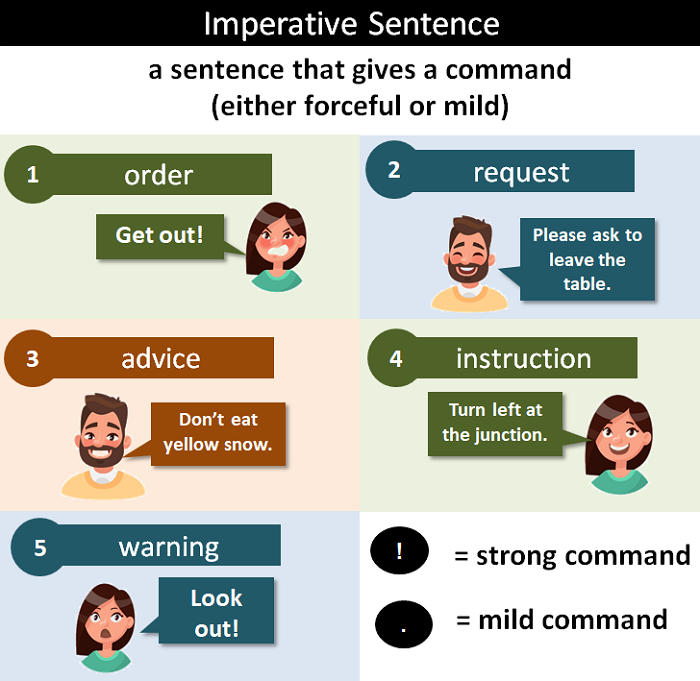
Imperative Sentence Definition
An imperative sentence is any sentence that issues a command to do something (or not do something). It requires an imperative verb, which is always in the infinitive form. Additionally, imperative sentences are always statements that end with a period or an exclamation point. Therefore, they exist in direct contrast to the interrogative sentence (a sentence that asks a question).

Imperative sentence structure
Imperative sentences nearly always start with imperative verbs. Imperative verbs are the root forms of verbs that, when followed by the objects of their sentences, form imperative sentences.
Take a look at the imperative verbs bolded in these examples:
- Follow me.
- Go back to school.
- Walk on the right side of the pathway.
As you can see, the verb usually comes first in an imperative sentence. But this isn’t always the case. Take a look at where the verb fits into these examples:
- Make sure you understand why we do this exercise.
- Please don’t spoil the movie.
Typically, the subject of an imperative sentence is implied.
In some imperative sentences, an indirect object also follows the verb. In others, there is no indirect object. And in some imperative sentences, like these, the verb is the entire sentence:
- Go.
- Stop!
- Run!
An imperative sentence always ends with either a period or an exclamation point.
4 Types of Sentence Structures
Generally speaking, there are four sentence types in English:
- Declarative Sentence – A sentence that makes a statement or offers an opinion.
- I went to the grocery store.
- Imperative Sentence – A sentence that issues a directive (demand, request, advice, invitation, or instruction).
- Go to your room!
- Interrogative Sentence – A sentence that asks a question.
- Do you know where to go?
- Exclamatory Sentence – A sentence that makes a statement with emotional emphasis (it always ends with an exclamation point).
- I forgot to return my book to the library!

Imperative Sentence Examples
Now that you understand the different types of sentence structures in English, let’s return to imperative sentences and look at some different examples. There are a few different reasons to use this type of sentence:
- Make a demand
- Make a request
- Offer advice
- Extend an invitation
- Give instructions
Here are a few examples of each:
Make a Request or Demand
- Wash the dishes.
- Move your car so I can leave.
- Don’t talk to him.
- Please arrive on time.
Offer Advice
- Don’t eat too much before bed.
- Remember to do your homework.
- Don’t forget to brush your teeth.
- Be sure to study all of the material before the test.
Extend an Invitation
- Come to the party tonight.
- Please join us for tea.
- Come sit with us!
- Come over to my house later.
Give Instructions
- Preheat the oven to 350 degrees.
- Add more oil to your car.
- Turn left at the stop sign.
- Connect the blue wire to the red wire.



